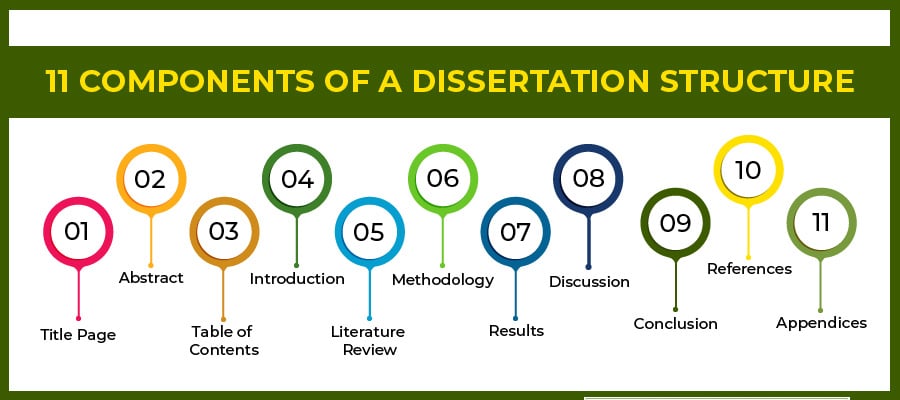Structure A Dissertation - Crafting Expert Writing Tips

Know the Dissertation Structure with Writing Tips and Examples
Are you a student who is asked to write a dissertation but has no clue about it? If yes, then you are in the right place! This blog is your perfect answer. It is because it explains what is the dissertation structure. Understanding the format is the first step to writing a remarkable document. Before we explain the layout, you need to understand the need for structuring a dissertation. So, without further ado, let us dive into it.
Why Is It Essential to Structure a Dissertation?
Dissertations are important documents that reflect the research, analysis, and subject expertise of students. However, showcasing these skills is only possible if you organize the content systematically. This can be achieved by organizing the information into sections and sub-sections. It not only assists in sorting data but also makes it easier for readers to understand the written content. Thus, ample information is provided without creating any confusion, and the argument is perfectly justified. So, now that we know why it’s needed, let us understand how to structure a dissertation from the perspective of our experts.
What Are the Various Components of a Dissertation Structure?
As discussed earlier, the dissertation is a lengthy document, comprising 300 pages on average. Thus, to organize all the information systematically, it is classified into 11 different sections. Each of these components fulfils a specific purpose and is equally important in justifying the argument. So, read about each of them, and if you have any doubts, seek dissertation help from our experts.

Title Page
The title is the first impression of the dissertation, and it should be unique, interesting, and catchy for the readers. Through this section, you will either be hooked on your paper or lose complete interest. Thus, you have to be very clear and concise with your title formation. Apart from the main heading, this section comprises other elements, which are listed below.
The Title Page of the Dissertation Should Contain:
- Main Heading
- Student’s Name
- Roll Number
- Course Details
- Subject Name
- Supervisors Name
- Institute Name
- Institute or Department Logo
- Date of Submission
Abstract
The abstract is the summary of the entire dissertation. It is written to provide a gist to hook your potential readers. It comprises interesting hints about the objectives, methods, results, and conclusions. In the dissertation structure UK, this section is placed after the title page yet is written at the end to avoid any confusion. Drafting the abstract after the entire document gives the writer a crystal clear idea of what information to include.
The Abstract of the Dissertation Should Contain:
- 150–300 words at maximum, as this section comprises a summary.
- A small brief on the main topic of the dissertation
- Objectives that the writer aims to address through their research
- Describe research methods which were used to accomplish the stated objectives.
- Few hints about the results and why they are useful for the readers.
Table of Contents
As the dissertation comprises hundreds of pages, the writers include a table of contents to make access easier. Each includes all important primary and secondary headings with their respective page numbers. The right placement of any specific section makes it easier for readers to navigate and access information.
The Table of Contents of the Dissertation Should Contain:
- A dissertation includes tables, so make sure to list them in this section.
- It should also include a list of charts, illustrations, and figures in ascending order.
- The list of all the primary sections and sub-sections.
Introduction
This is where the actual dissertation begins. Yes, until now, in the above sections, you have dropped hints about the topic. But in this section, you need to brief your readers on the topic. It should provide ample information on what readers can expect in this document. So, you have to build context and create a clear understanding in the reader’s mind of the topic and other sections.
The Introduction of the Dissertation Should Contain:
- Introducing the research topic and a clear explanation of the same.
- The scope of the research and its uses in day-to-day life
- The thesis statement of your dissertation
- The hypotheses or other secondary objects that you aim to address
- An overview of the other sections of the document
Students Also read : Accounting Dissertation Topics
Literature Review
The structure of a dissertation is incomplete without a literature review. This section alone comprises 25% of the entire document. Its purpose is to provide a complete understanding of the topic by offering sufficient information. Thus, it includes an in-depth description of the existing research. To write the literature review, students need to perform extensive data collection, and they should only use credible sources of information.
The Literature Review of the Dissertation Should Contain:
- Summary of previous already-known theories
- Analysis of existing research and its credibility
- Identifying areas for advancement or recognizing limitations
Methodology
The dissertation methodology is an explanation of how you accomplished your objectives. It means what research method was used to accomplish the objectives. So, provide a step-by-step explanation of each experiment so that readers can use the same methods in the future. Do not miss out on any major detail, and be as accurate as possible.
The Methodology of the Dissertation Should Contain:
- The list of instruments and tools used to conduct and analyze the data
- The step-by-step process of each experiment is described in detail.
- Any necessary warnings and cautions to follow while conducting experiments
Results
In the next section of the dissertation structure, you describe the outcomes of each experiment. It only comprises raw results and takes away opinions and judgment. So, avoid the critical analysis and present your figures systematically.
The Results of the Dissertation Should Contain:
- Raw data, including figures and other outcomes
- Tables and illustrations to support and present findings
- Any identified patterns or visual representations
Discussion
The dissertation discussion comprises 25 to 30% of the entire document. This section comprises a critical analysis of the entire research and evaluates the results. Students can also conduct a comparison between the current findings and existing theories.
The Discussion of the Dissertation Should Contain:
- A comparison of the expected and actual results
- An elaboration on the challenges faced and limitations of the research
- Suggestions for future developments and advancements,
- Stating opinions and providing descriptions to justify the argument
Conclusion
This project is lengthy, and due to this, it becomes impossible for students to remember all the details. Thus, in the dissertation conclusion, students need to write a summary of the entire document. So, while drafting this section, make sure to cover all the major information and do not introduce any new ideas.
The Conclusion of the Dissertation Should Contain:
- Re-introducing the topic and stating the objectives
- Explaining how you were successful in achieving the listed motives
- Highlighting primary achievements and accomplishments
- Throwing a light on the limitations and challenges
References
Every document should include references, especially the dissertation. So, in this section, you need to define all the sources that you used for research. But the critical part here is that there are several citation guidelines, and each university follows a different one. Thus, you need to include your sources as per the reference style of your institute.
The References of the Dissertation Should Contain:
- The links to websites that you referred to for data collection.
- All the web sources you used for data analysis
- the name of the book and author that you referred to for any information.
Appendices
The appendices are an additional section in the dissertation structure and include all the extra information. Any data that is not necessary or does not directly prove a point and is interrelated can be included in the appendices. If you think the information is ample, divide this section into Appendices A and B, then sort the data accordingly.
The Appendices of the Dissertation Should Contain:
- Lengthy calculations of the methodology or results
- In-detail tables or extra illustrations and diagrams
- Glossary, which comprises the definition of complex words.
- Abbreviations and their full forms
Dividing your dissertation into 11 separate sections can put you one step closer to A+ grades. This is because a systematic structure helps to provide sufficient and organized information. Not only this, it is easier to understand and justify the argument. But are you still confused about any component of the dissertation structure UK? The best alternative is to refer to the examples given by experts.
Still Having Doubts? Check Our Dissertation Examples for Better Clarity!
It is possible to get confused while understanding the dissertation structure. Especially if there are several components in a single document. So, in such cases, all a student needs is a practical perspective for understanding. So, to attain better clarity on the format, they can check out the samples written by our experts. These dissertation structure example are appropriately organized and accurately drafted.
- Law Dissertation Sample
- Psychology Dissertation Sample
- Business Dissertation Sample
- Engineering Dissertation Sample
Check out all these accurate dissertation structure example, and you will have a clear idea of the format. Not only this, but you will also gain clarity on how to draft such a lengthy document. Still, if you are confused, seek assistance from our dissertation writing services. The team is available 24 hours everyday to guide you.
Free Tools

Easy to Use Paraphrasing Tool to Simplify Complex Academic Writing
Check Now
Get Structured Outline by Professionals for Your Dissertation
Check Now
Effortlessly manage citations and references with our smart referencing tool
Check NowLowest Price Guarantee
Get A+ Within Your Budget!Price Calculator
Offers & Benefits
Get upto 56% OFF on Your First Order !
Offers Benefits
Other Services
Latest Blogs

- 17 Apr 2025
- 4734 Views

- 20 Mar 2025
- 1039 Views

- 04 Mar 2025
- 648 Views

- 28 Feb 2025
- 859 Views




















Thank you for submitting your comment on this blog. It is under approval. We will carefully review your submission and post it on the website.